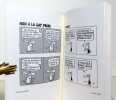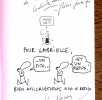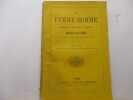-
Type
Autograph (1)
Book (53138)
Magazine (286)
Manuscript (2)
Maps (1)
New book (1)
Old papers (1)
Photographs (1)
-
Latest
Last 24h (47)
Last 3 days (31)
Last month (550)
Last week (93)
-
Language
Dutch (2)
English (28)
Finnish (1)
French (53327)
German (16)
Greek (5)
Italian (17)
Japanese (2)
Latin (20)
Polish (1)
Portuguese (2)
Russian (1)
Spanish (7)
Swedish (2)
-
Century
16th (66)
17th (197)
18th (1273)
19th (3680)
20th (22517)
21st (3819)
-
Countries
Belgium (6744)
Brazil (28)
Canada (6)
China (2)
Côte d'Ivoire (63)
Denmark (1012)
France (40678)
Germany (4)
Greece (3)
Italy (54)
Netherlands (281)
Switzerland (4555)
United States of America (1)
-
Syndicate
ALAC (6)
CLAM (5)
CNE (6)
ILAB (22238)
NVVA (1045)
SLACES (953)
SLAM (19919)
SNCAO (41)
Les Chemins de l'être (Une Discussion)
Editions Albin Michel Broché 1965 In-8 (13,1 x 20 cm), broché, 258 pages, envoi des auteurs à Théodore Monod et sa femme ; nombreuses annotations en page 33, pliures au dos, quelques traces et rousseurs sur les plats, le dos et les tranches, par ailleurs assez bon état général. Livraison a domicile (La Poste) ou en Mondial Relay sur simple demande.
A la recherche de l'homme
Istra 1954 in8. 1954. Broché.
Bon état couverture défraîchie livre jauni intérieur propre
Mois de Marie avec notre-dame de Fatima
Bonne Presse. 1945. In-12. Broché. Etat d'usage, Couv. convenable, Dos abîmé, Papier jauni. 126 pages. Manque sur le dos coiffes abîmées.. . . . Classification Dewey : 210-Philosophie et théorie
Classification Dewey : 210-Philosophie et théorie
An Introduction to Logic.
London, Hutchinson Uni. Lib., (1962). 8vo. Orig. full cloth. 192 pp.
First edition.
Being and Participation. The Method and Structure of Metaphysical Reflection according to Cornelio Fabro [2 volumes]
Rome, Ateneo Pontificio Regina Apostolorum 2012 Complete in 2 volumes, 848pp. (continuous pagination), 24cm., softcovers, Doctoral Dissertation, text and interior are clean and bright, good condition, weight: 1.4kg., F120291
Le Tourment de l'Unité
1 vol. in-12 br., Société du Mercure de France, Paris, 1901, 394 pp.
Etat satisfaisant (dos refait, nomb. annotations au crayon). Exemplaire peu commun de l'édition originale (tirage ordinaire après 10 hollande). Président du conseil municipal de Paris de 1914 à 1919, Adrien Mithouard (1864-1919) fut avec Albert Chapon le cofondateur de la revue "L'Occident".
Raices de la ontologia antimetafisica de Nikolai Hartmann
Barcelona, 1958 58pp., 25cm., text in Spanish, excerpt from a doctoral dissertation ("Excerpta ex dissertatione ad lauream in Facultate Philosophica Pontificiae Universitatis Gregorianae"), softcover, stamp at verso of title page, text is clean and bright, F112993
VERS LA SOCIETE SANS PERES
Gallimard. 1969. In-8. Broché. Bon état, Couv. convenable, Dos satisfaisant, Intérieur frais. 354 pages.. . . . Classification Dewey : 100-PHILOSOPHIE ET DISCIPLINES CONNEXES
Nrf. 'Connaissance de l'inconscient', dir. par J.B. Pontalis. Essai de psychologie sociale. Trad. de l'all. par Maurice Jacob. Avec la collab. de Pierre Dibon. Classification Dewey : 100-PHILOSOPHIE ET DISCIPLINES CONNEXES
Onverwerkt verleden. De psychoanalyse van het onvermogen om te rouwen.
, Anthos: Baarn, 1988, Softcover, 142pp., zeer goede staat.
Kants 'Erste Antinomie' unter besonderer Berücksichtigung der Raumtheorie von Newton, Leibniz und Kant
Köln, 1992 [6] + 313pp., 21cm., softcover, text in German, Doctoral dissertation (Inaugural-Dissertation zur Erlangung des Doktorgrades der Philosophischen Fakultät der Universität zu Köln), stamp at verso of title page, text is clean and bright, good condition, F108785
LE REGARD ET LE SIGNE. Poétique du roman réaliste et naturaliste
Paris Presses Universitaires de France 1987 in 8 (21,5x13,5) 1 volume broché, couverture à rabats, 291 pages [2]. Collection '' écriture ''. Première édition. Bon exemplaire
Très bon Broché
MITTERAND (F.), ATTALI (J.), CHEVENEMENT (J.-P.), CREPEAU (M.), DELORS (J.), PIERRET (C.) et MAUROY (P.).-
Reference : 19515
Le bonheur, la vie, la mort, Dieu... Entretiens recueillis par Jean-Yves Boulic.
P., Editions du Cerf (Collection "Pour quoi je vis"), 1981, in 8° broché, 149 pages.
...................... Photos sur demande ..........................


Phone number : 04 77 32 63 69
MITTERAND F., ATTALI J., CHEVENEMENT J.-P., CREPEAU M., DELORS J., PIERRET Ch et MAUROIS P.
Reference : 63451
ISBN : 2204017515
Le bonheur, la vie, la mort, Dieu. Collection : Pourquoi je vis.
Paris, Editions du Cerf, 1981. 13 x 19, 149 pp., broché, bon état.
entretiens recueillis par Jean-Yves Boulic.
Das Ringen der alten Stoff-Form-Metaphysik mit der heutigen Stoff-Physik
Innsbrück, Tyrolia-Verlag 1935 160pp., in the series "Wandel des Weltbildes von Thomas auf Heute" Band I, few stamps
Wesensartwandel und Artensystem der physikalischen Körperwelt
Bressanone, A.Weger 1936 227pp.with 22 ills., in the series "Wandel des Weltbildes von Thomas auf Heute" Band II, few stamps
LES FORCES DE L ESPRIT- MESSAGES POUR DEMAIN
FAYARD. 1997. In-8. Broché. Bon état, Couv. convenable, Dos satisfaisant, Intérieur frais. 160 pages. . . . Classification Dewey : 190-Philosophie occidentale moderne
Classification Dewey : 190-Philosophie occidentale moderne
Démocraties et libertés
Foyer Philosophie Paris, Foyer Philosophie, 1947. In-8 broché (agrafé) de 14 pages. Bon état
Toutes les expéditions sont faites en suivi au-dessus de 25 euros. Expédition quotidienne pour les envois simples, suivis, recommandés ou Colissimo.
PETIT GUIDE DES FONCTIONS LITURGIQUES - A L'USAGE DES JEUNES ACOLYTES
TEQUI. 1983. In-8. Broché. Bon état, Couv. convenable, Dos satisfaisant, Intérieur frais. 86 pages. Nombreuses illustrations en noir et blanc, dans le texte.. . . . Classification Dewey : 210-Philosophie et théorie
Préface du Cardinal FRANCOIS MARTY. Illustrations de JEAN-PHILIPPE POIRIER. Classification Dewey : 210-Philosophie et théorie
Mix & Remix (ill.) - Marianne Basler, Jean-Luc Bideau, Laurence Deonna, Henri Dès, Massimo Lorenzi, Bertrand Picard, Bernard Pichon, Michel Pont et al.:
Reference : 17946
(2007)
Raciste, moi ? Le racisme vu par. . .
LICRA - Ligue internationale contre le racisme et l'antisémitisme, 2007. In-8 broché, couverture illustrée, insolée en bord. Nombreuses illustrations en noir par le regretté Mix & Remix.
2e édition, aussi vite épuisée que le fut la première.
Mix & Remix (ill.) - Marianne Basler, Jean-Luc Bideau, Laurence Deonna, Henri Dès, Massimo Lorenzi, Bertrand Picard, Bernard Pichon, Michel Pont et al.:
Reference : 23052
(2002)
Raciste, moi ? Le racisme vu par. . .
LICRA - Ligue internationale contre le racisme et l'antisémitisme, 2002. In-8 broché, couverture illustrée, insolée en bord. Nombreuses illustrations en noir par le regretté Mix & Remix.
Exemplaire agrémenté d'une triple dédicace (les 2 premières signatures nous restent obscures), dont une de Mix & Remix, accompagnée d'un dessin-gag original.
Un fort volume in-12 (13 X 8,5 cm)dans lequel sont réunis trois ouvrages publiés à Francfort en 1598 et 1599 chez Sautii pour Mizauld et chez Fischeri et Rhodii pour Bright et Fine. Mizault. Centuriae memorabilium utilium, ac jucundorum in occultismeaphorismos Arcanorum omnis generisiocupletes, perpulère digestae. Page de titre, (7 pages non-chiffrées), (22 pages non-chiffrées d'index), 267 pages suivi de Memorabilium aliquot naturae arcanorum sylvula, rerum variarum sympathias, & antipathias, feu naturales conconrdias & discordias, libellis duobus complectens. 99 pages. Suivi de harmonia coelestium corporum et humanorum, dialogis undecim astronomice & medice per Anton Mizaldum Monlucianum elaborata & demonstrata.Ad Antonium Olivarium lumbariensium antistitem eximium. 94 pages. Relié avec: Bright. Hygieina id est, De Sanitate tuenda, midicinae pars prima .Therapeutica hoc est, De sanitate restituenda, medicinae pars altera. 90 pages-(3 feuillets blancs)-111 pages. Relié avec: Ficini.De Vita. (8)-160 pages. Vélin doré à rabats d'époque, filets et fleurons dorés au dos , triple filet dorés encadrant les plats avec des fleurons d'angles et un médaillon au centres des plats. Sur le plat supérieur le mot "Jean" est inscrit en lettres d'or dans le médaillon, et au second plat le nom "Charil". Papier fortement oxydé surtout pour les ouvrages de Mizault, petites mouillures claires et marginales en fin de volume.(LXX)-(340gr.).
Antoine Mizauld, astrologue et médecin, il s'adonna à l'astrologie avec Oronce Fine et devint astronome et médecin de Marguerite de Valois,reine de Navarre, soeur de François 1er et auteur de l'Heptaméron nous dit Caillet. Timothy Bright, médecin britannique est l'auteur d'un traité sur la mélancolie publié en 1586 qui aurait influencé Shakespeare pour son personnage d'Hamlet, et d'une méthode de sténographie. Le présent ouvrage,en deux parties, traite de l'hygiène et des soins. Marsile Ficin, poastrologieète et médecin de Côme et de Laurent de Médicis, qui fut le plus grand platonicien toscan de la renaissance et qui s'intéressa à l'occultisme et à l'hermétisme. "De triplia vita", les trois livres de la vie, que l'on peut interpréter dans le 1er livre comme un recueil de recettes et de régimes alimentaires pour organiser sa vie et ses habitudes pour vivre dans de bonnes conditions astrologique, et qui s'adresse dans le second plus particulièrement aux personnes âgées. Le troisième livre a été le plus contreversé comme traitant de sujets jugés proche de l'hérésie par exemple de tirer des forces célestes le pouvoir d'animer des objets, de canaliser le pouvoir que le divin avait implanté dans la nature pour que l'humanité puisse l'utiliser. On retrouve le nom de Jean Charil dans la paroisse de Le Pertre, commune d'Ile et Vilaine coupée par la frontière du Maine et de la Bretagne.
"Confucianisme et sociétés asiatiques (Collection ""Recherches asiatiques"")"
L'Harmattan. 1991. In-8. Broché. Bon état, Couv. convenable, Dos satisfaisant, Intérieur frais. 190 pages.. . . . Classification Dewey : 180-Philosophie antique, médiévale, orientale
"Collection ""Recherches asiatiques"", dirigée par Alain Forest. Classification Dewey : 180-Philosophie antique, médiévale, orientale"
M. J. BEDARRIDE, avocat (Augmentée d'une lettre à l'auteur par )
Reference : 18403
(1872)
La Femme-Homme - Mariage - Adultère - Divorce - Réponse d'une femme à M. Alexandre Dumas Fils - Augmentée d'une lettre à l'auteur par M. J. BEDARRIDE, avocat
1872 PARIS, E. Dentu, 1872 - Sixième édition -Plaquette in-12 - Broché - 64 pages - bon exemplaire - Réf. 18403
 Write to the booksellers
Write to the booksellers



















